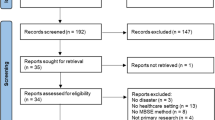Abstract
Continuity of Operations Planning (COOP) is actions taken before, during and after a disaster to maintain the delivery of an organization’s essential services. The application of COOP in public health is necessary to save lives and protect population health when disaster strikes. However, COOP decision-making and COOP decision support technology are under-explored in the public health domain. This work approaches the problem of designing a COOP decision support system for a large municipal public health agency using scenario-based design. Through a series of meetings and informal interviews, we developed a set of 12 scenarios of use for public health decision-making roles during a pandemic. These scenarios were validated as reliable, useful and acceptable by professional public health COOP planners. The results of this work show scenario-based design can be a powerful tool in designing decision support systems for public health leadership information needs during a crisis.
Similar content being viewed by others
References
Logue, J. N., The public health response to disasters in the 21st century: Reflections on Hurricane Katrina. J. Environ. Health. 69 (2)9–13, 2006.
Somers, S., Survey and assessment of planning for operational continuity in public works. Public Works Manag. Policy. 12 (2)451–464, 2007.
Buehler, J. W., Whitney, E. A., and Berkelman, R. L., Business and public health collaboration for emergency preparedness in Georgia: A case study. BMC Public Health. 6:285, 2006. doi:10.1186/1471-2458-6-285.
Carroll, J. M., Five reasons for scenario-based design. Interact. Comput. 13 (1)43–60, 2000. doi:10.1016/S0953-5438(00)00023-0.
Carroll, J. M., Scenario-based design: Envisioning work and technology in system development. Wiley, New York, 1995.
Rosson, M. B., and Carroll, J. M., Usability engineering: Scenario-based development of human-computer interaction. Morgan Kaufmann series in interactive technologies. Academic, San Francisco, 2002.
Friedman, C. P., Wyatt, J. C., and Owens, D. K., Evaluation and technology assessment. In: Shortliffe, E. H., and Cimino, J. J. (Eds.), Biomedical Informatics: Computer Applications in Health Care and BiomedicineSpringer, Berlin, pp. 403–443, 2006.
Blomberg, J., et al., Ethnographic field methods and their relation to design. In: Schuler, D., and Namioka, A., (Eds.), Participatory Design: Principles and PracticesErlbaum, Hillsdale, NJ, pp. 123–155, 1993.
Ulin, P. R., Robinson, E. T., and Tolley, E. E., Qualitative methods in public health: A field guide for applied research. Jossey-Bass, San Francisco, CA, 2005.
Krathwohl, D. R., Methods of educational & social science research: An integrated approach. Longman, New York, 1998.
Acknowledgments
This study was supported in part by the National Library of Medicine Medical Informatics Training Grant T15 LM007442-07. The authors would like to thank John Hartman and Dee Totten for their invaluable contributions and feedback.
Author information
Authors and Affiliations
Corresponding author
Rights and permissions
About this article
Cite this article
Reeder, B., Demiris, G. Building the PHARAOH Framework Using Scenario-Based Design: A Set of Pandemic Decision-Making Scenarios for Continuity of Operations in a Large Municipal Public Health Agency. J Med Syst 34, 735–739 (2010). https://doi.org/10.1007/s10916-009-9288-3
Received:
Accepted:
Published:
Issue Date:
DOI: https://doi.org/10.1007/s10916-009-9288-3




